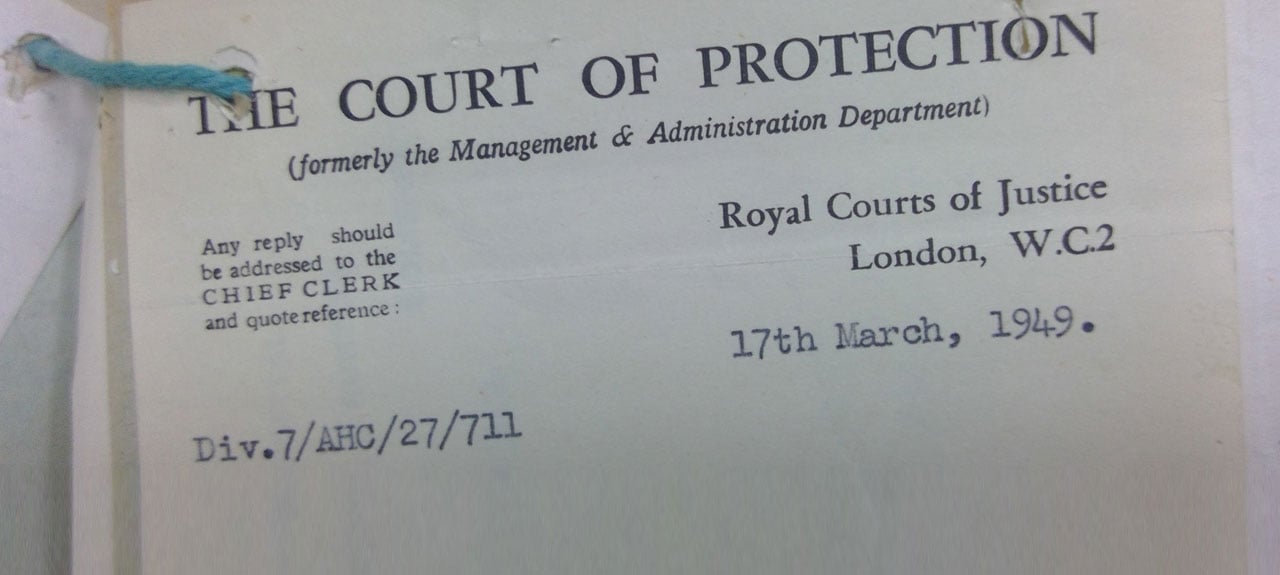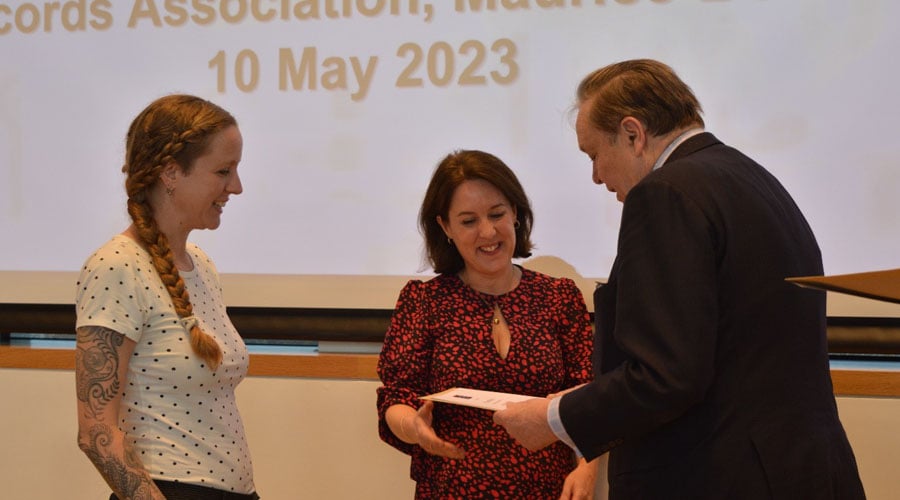This is the public engagement strand of the research project ‘Managing mental capacity: a history’. Assessments of capacity evaluate whether adults can make their own decisions regarding their personal and financial lives, usually prompted by mental illness, learning disability, or dementia. For centuries, these assessments have been undertaken in England & Wales by the Court of Protection: this research explores this history.
Jean Carr and Beatrice Alexander were both found incapable in law of managing their own affairs in the 1930s, as a result of ‘mental infirmity’. Our two short films introduce their stories. You can also browse some of the archival documents that inspired the films, find out what happened next to Miss Carr and Miss Alexander, and learn about the Court of Protection today.
This project is part of the ‘Measuring mental capacity’ research study at the Centre for History in Public Health, London School of Hygiene and Tropical Medicine.
It was funded by the Wellcome Trust, research enrichment grant number 209884/Z/17/A.
The films were produced by Dead Earnest Theatre in 2021, and screened as part of interactive online events during the Being Human Festival that year. These events aimed to introduce the history of the Court of Protection to a wider audience, to generate interest and awareness of archival holdings about mental capacity law, and to encourage reflection and discussion about how decisions regarding capacity, vulnerability, and protection should be made.
Today, formal assessments of capacity evaluate whether adults can make their own decisions regarding their personal and financial lives, and are usually prompted by dementia, learning disability, traumatic brain injuries, or severe mental illness.
For centuries, these assessments were undertaken in England and Wales by an office of the court, usually known as the ‘Lunacy Office’. In 1947, it was renamed the Court of Protection.
Archives from this office are stored at the National Archives in London. Our research into the history of the Court of Protection gave some insight into how law and practice around mental capacity has developed. It also introduced us to some of the people whose lives it changed.
Watch the trailers for our short films about two of these people, Jean Carr and Beatrice Alexander.
- Jean Carr
-
Miss Jean Carr was assessed and found incapable of managing her own affairs in 1934, shortly after her 21st birthday. Her mother had applied to the Lunacy Office, and was then appointed as Miss Carr’s ‘receiver’: the person who would look after her finances on her behalf. Miss Carr was often unhappy about this, and tried several times to have the receivership brought to an end.
Watch this short film dramatizing some of her story:
Find out more about Miss Carr’s case.
- Beatrice Alexander
-
Miss Beatrice Alexander was found incapable of managing her own affairs in 1939, when she was 59. A retired housekeeper, she had inherited a large house and income a few years earlier. Her neighbours became worried when a local family with a bad reputation moved in with her, and seemed to be exploiting her gentle nature and taking control of her home and money. Was she incapable of managing her own affairs?
Watch this short film dramatizing some of her story:
Find out more about Miss Alexander’s case.
The files about Miss Alexander and Miss Carr can be found in the National Archives, London, alongside many other files about hundreds of men and women who were found incapable of managing their own affairs between the early 1900s and the 1970s. This archival collection represents a small sample – about 2% - of all case files.
Miss Alexander
Miss Alexander remained legally incapable for the rest of her life. Her nurse-companion, Miss Wortt, lived with her at her home for twenty-five years, until Miss Alexander had to move to a nursing home providing round-the-clock care. The two women became very fond of each other: Miss Wortt visited Miss Alexander regularly until her death in 1969. They did not see the Humphries family again.
Records about Miss Alexander are part of the archives of the office of the Official Solicitor, because the Official Solicitor was appointed to be her receiver. There are 13 files, under catalogue reference J 127/24-36 inclusive.
- Dr Stephenson’s original letter to the Lunacy Office, April 1939 (file J 127/24)
- Dr Vivian’s statement, June 1939 (file J 127/24)
- Mr Winder’s report, November 1939 (file J 127/24)
- Miss Alexander’s letter, December 1939 (file J 127/24)
- Private Humphries’ letter, January 1940 (file J 127/25)
- Miss Wortt’s letter, February 1941 (file J 127/27)
- Photograph of the Old Rectory (file J 127/33)
Miss Carr
Miss Carr was relieved to be found capable of managing her own affairs, but remained unhappy about how she had been treated. She went on to live a long but somewhat reclusive life. She did not marry, and does not seem to have fallen into the hands of unscrupulous persons. She died in 1992, leaving her home to charity to benefit artists.
Records about Miss Carr come from the Lunacy Office/Court of Protection archive. There is just one file, covering the whole period from her 21st birthday in 1934 to the end of her receivership in 1939. Its catalogue reference is J 92/77.
- Mrs Carr’s application to the Lunacy Office, 1934
- Dr Macdonald’s statement, September 1936
- Mrs Carr’s statement, February 1939
- Official Visitor’s report, March 1939
- Miss Carr’s letter, June 1939
- Restoration of property, July 1939
Further reading
This book, published by McGill-Queen’s University Press, explores Beatrice Alexander’s life and experiences in more detail. It will be available from all good bookshops from January 2023.
Transparency, privacy, and the history of the Court of Protection
This blog for the Open Justice Court of Protection project looks at the history of the Court and its efforts to balance public accountability and transparency with privacy and discretion.
This journal article reviews the twentieth century history of the Court of Protection in terms of its structure and caseload, and reviews some of the difficulties that it faced over the years.
Citizenship, vulnerability, and mental incapacity in England, 1900-1960s
This journal article looks at how mental capacity has been understood in the past, in relation to vulnerability, citizenship, and mental illness.
Mental Capacity Law and Policy blog
This blog is written by barrister and academic Alex Ruck Keene, and it provides commentary on recent cases and access to research about the Mental Capacity Act as it operates today.
This is the official website of the Court of Protection, which is a part of HM Courts and Tribunals service.
Open Justice Court of Protection project
This project aims to encourage and promote transparency and open justice in the Court of Protection today. It provides information and advice about attending Court of Protection proceedings as an observer, and blogs from others who have done so.
We were delighted to be awarded this prize, for the best or most original piece of published work that reflects the aims of the British Records Association: to promote the preservation, understanding, accessibility and study of our recorded heritage for the public benefit. It was established in memory of Janette Harley, a member of the Association who died in 2015.
Looking after Miss Alexander: Care, Mental Capacity, and the Court of Protection in Mid-Twentieth-Century England will be published by McGill-Queens University Press in early 2023. This book explores Beatrice Alexander’s life and experiences with the Court of Protection in detail, using her unusual case to explain the workings of the court, and highlighting the role of chance, subjectivity, and uncertainty in shaping how events unfolded and how we interpret them today.
To pre-order a copy with a 30% discount, download this leaflet or contact janet.weston@lshtm.ac.uk
Interactive screenings of these films were presented as part of the Being Human Festival in November 2021.
If you would like to host a screening and discussion, please get in touch.




